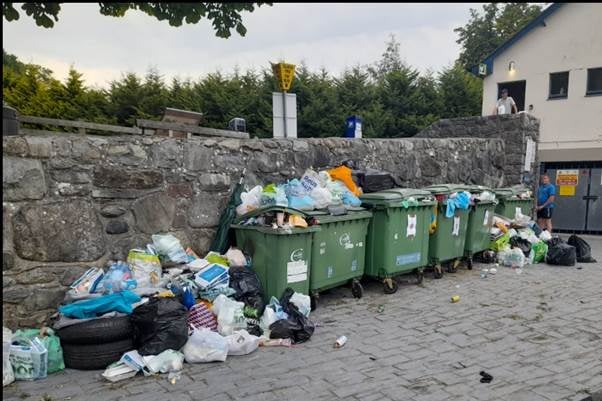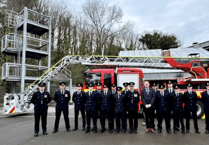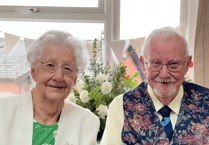As the country gears up for the August bank holiday weekend, Fly-tipping Action Wales have issued advice on people coming to Brecon on how to avoid 'unintentional fly-tipping'.
When you think of ‘fly-tipping’, images of abandoned sofas, tyres and unwanted bulky household items are likely to come to mind. However, the growing problem of unintentional fly-tipping is affecting popular summer spots across Brecon’s landscape.
According to Fly-tipping Action Wales (FtAW), incidents of unintentional fly-tipping, when members of the public leave their waste next to overflowing bins or abandon the likes of barbecues and camping equipment at beauty spots, have risen over the summer months causing real harm to Wales’ environment.
Neil Harrison, Project Manager at Fly-tipping Action Wales, said: “We’re seeing a concerning increase in what we’re calling ‘unintentional fly-tipping’. People think they’re being helpful by leaving their rubbish beside the bins, but in reality, it’s an instance of illegal fly-tipping.
“There’s only so much capacity for local authority refuse collectors, and it’s not safe to leave an unmanageable surplus of rubbish for collection. This means that leaving bins overflowing is not only an environmental issue but also a public health matter. What’s more, any member of the public found guilty of fly-tipping could face a costly fine.
“We’re asking members of the public to help us protect Wales’ natural environment and take their rubbish home if bins are full, allowing beauty spots to be enjoyed by all.”
To help tackle the issue, Fly-tipping Action Wales has created a list of its five top tips on how to avoid becoming an ‘unintentional fly-tipper’ this bank holiday weekend.
1. Prepare for your picnic
Ensure that you bring your own rubbish bags to clear away any litter and if bins nearby are full, take your rubbish home — as leaving waste next to an overfilled bin is considered fly-tipping. Avoiding single-use plates and cutlery can also reduce your waste and is great for the environment.
2. Think before you barbecue
Many supermarkets no longer sell disposable BBQs given how detrimental they can be to the environment and wildlife. If you do use a disposable BBQ, always check that you are legally allowed to use it in that area and think about how you will responsibly dispose of the BBQ to avoid grassland fires and damage to bins.
3. Be a considerate camper
An increase in people taking up outdoor pursuits has had a negative impact on ecosystems across Wales through improper toilet activity, littering, and fly-tipping. To ensure you protect the nature you’re exploring, always follow the Countryside Code.
When attending festivals, avoid buying a cheap tent with the intention of leaving it behind for the event organisers to dispose of. It is very difficult to recycle tents, and this is actually an example of fly-tipping. Instead, consider hiring a tent or buying a tent for repeat use.
4. Make your gardening greener
It is essential to dispose of green waste responsibly — as dumping garden waste in a field, forest, common land, or over the back fence can cause significant harm to the environment. If you are found to have dumped your garden waste, you could face a fine for small-scale fly-tipping of up to £400.
Check with your local council to find out if they offer a free or chargeable garden waste collection service. If your bin is full, you can recycle garden waste at your local household waste recycling centres.
5. Respect the water
Beaches and rivers are popular summer destinations, and a quintessential part of the Welsh summer, which is why it is so important that they are kept clean and free of pollution.
Whether you’re participating in water sports or simply enjoying the beach, make sure not to throw any waste into the sea, including bottles, wrappers, or fishing lines. Use nearby waste bins or, if none are available, take your waste home with you.
To find out more about Fly-tipping Action Wales, visit: www.flytippingactionwales.org




